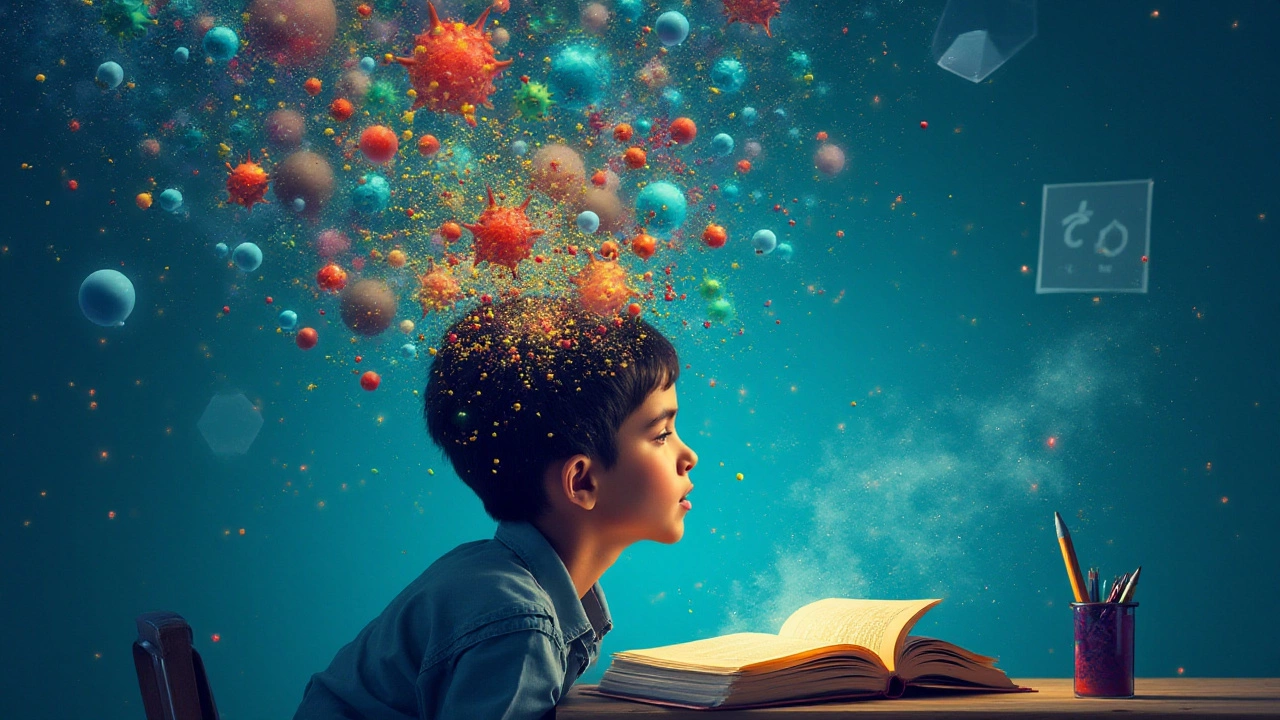Preparing for the JEE exam can feel like a daunting journey, with its vast syllabus covering physics, chemistry, and mathematics. Among these, physical chemistry often stands out as a challenging subject for many students. It's tempting to consider skipping it, but this decision might not be wise for those aiming for top scores.
Physical chemistry integrates principles of physics and chemistry to understand the physical foundation of chemical systems and processes. This blend makes it both fascinating and tricky. Many questions in the JEE are designed to test a student's understanding of core topics within this area, making its mastery crucial for success.
Students aiming to excel cannot ignore this section of the syllabus. However, by adopting efficient study techniques and utilizing the right resources, tackling physical chemistry can become more manageable. It's about finding the right balance and developing a solid grasp of the basics to advance smoothly.
- The Significance of Physical Chemistry in JEE
- Strategies for Mastering Physical Chemistry
- Common Challenges and How to Overcome Them
- Practical Tips and Resources for Learning
The Significance of Physical Chemistry in JEE
Physical chemistry is like the backbone of the chemistry section in the IIT JEE exam. It's a branch that beautifully marries the concepts of physics and chemistry to form a better understanding of chemical phenomena from a physical perspective. This unique interdisciplinary approach allows students to grasp intricate details about chemical reactions, thermodynamics, kinetics, and equilibrium, which are pivotal for success in the JEE.
One key aspect that makes physical chemistry crucial is its integration into various topics across the JEE syllabus. Many questions in the exam rely on a strong understanding of concepts like the ideal gas law, colligative properties, chemical kinetics, and more. Being comfortable with calculations and problem-solving using these principles is where physical chemistry becomes indispensable.
"Physical chemistry provides the quantitative tools essential for the scientific understanding of chemical processes," remarked Lee & Murray in 'Chemical Principles'.
Mastering physical chemistry not only boosts your overall chemistry score but also enhances your analytical abilities. Students who have a good grasp of this segment tend to perform better in related sections of physics as well due to the overlap in problem-solving techniques. Consider topics like collision theory and kinetic molecular theory, which correlate well with certain physics concepts, thereby creating a synergy in learning.
An interesting fact is how frequently physical chemistry questions appear in the JEE. It's estimated that around 30% of the chemistry section is dedicated to physical chemistry topics. Therefore, a solid foundation in this subject can make a significant difference in your overall score. Students are often surprised at how understanding principles like the equilibrium constant or the Arrhenius equation can equip them to tackle seemingly complex questions with ease.
Moreover, the logical and numerical nature of problems in physical chemistry aligns well with mathematical skills. Students strong in mathematics often find these sections easier to navigate. The calculations involved give an edge to those who are willing to drill down into problem-solving techniques. As a preparation tip, regular practice of numericals and conceptual questions will build the confidence needed to ace this essential part of the JEE exam.
In conclusion, overlooking physical chemistry is not advisable for any JEE aspirant aiming for excellence. Its widespread relevance and the foundational skills it develops make it an indispensable part of your preparation strategy. With dedication, understanding, and practice, physical chemistry can transform from an intimidating subject into one of your strongest tools for JEE success.
Strategies for Mastering Physical Chemistry
Mastering physical chemistry requires a well-thought-out strategy, as this subject is a confluence of concepts from both physics and chemistry. One effective way to start is by building a strong foundation in basic concepts such as the mole concept, atomic structure, and chemical bonding. Grasping these fundamental ideas is essential because they are the bedrock upon which more complex topics are built. You can't solve advanced thermodynamics problems or crack intricate equilibrium questions without first mastering these basics. Dedicating a few weeks to diligently review and understand these core principles can set a solid stage for tackling more challenging areas.
There is also immense value in developing a systematic approach to solving numerical problems. Many students find themselves stuck due to a lack of structured problem-solving techniques. Implementing a step-by-step strategy can be incredibly helpful. Start by understanding what the problem is asking, identify the known and unknown variables, and recall which equations or concepts might apply. From there, solve step by step, checking your work as you go. This habit not only boosts accuracy but also builds confidence critical for the actual exams. As a practical tip, solving previous years’ JEE problems can greatly aid in understanding the types of questions frequently asked.
"The key to understanding physical chemistry is practice. The more problems you solve, the more intuitive the subject becomes,” says a senior faculty member from a reputed IIT coaching institute.
Visual aids, such as diagrams and charts, can be indispensable tools in mastering physical chemistry. Drawing phase diagrams, molecular structures, or reaction coordinate graphs can help visualize complex processes. Visualization is a potent tool because it converts abstract ideas into something more tangible. For instance, drawing the Maxwell-Boltzmann distribution can clarify energy distribution among molecules, providing insights that might be tough to glean from text alone. Consider compiling a dedicated notebook for these diagrams; over time, this personalized resource becomes a valuable study guide.
Another crucial tip is to actively engage with digital resources. We live in a time when educational content is more accessible and varied than ever. Videos, interactive simulations, and online courses offer alternative ways to explore physical chemistry topics. Platforms like YouTube and Khan Academy have excellent educational content that can explain difficult concepts in digestible manners. Engaging with these resources doesn't only help in diversifying your learning source but also makes study sessions more interactive and less monotonous.
It is also worth noting the importance of forming study groups. Group study can offer support and different perspectives that might not be apparent when studying alone. Discussing problem sets, explaining concepts to peers, and even debating theoretical questions can deepen your understanding. Often, teaching a concept to someone else can significantly enhance your own comprehension. Within a group, you may gain insights and problem-solving approaches you hadn't considered.
If you have time, consider attending seminars or workshops focused on chemistry and physics. These gatherings often host experts who share their knowledge and experience, introducing cutting-edge research or innovative problem-solving techniques. Such experiences can inspire fresh ideas and approaches that can bring a new dimension to your study sessions.

Common Challenges and How to Overcome Them
When diving into the world of physical chemistry, many students quickly encounter a steep learning curve that can feel overwhelming. One common challenge is the abstract nature of certain concepts, which often require a firm grasp of both mathematical skills and chemical intuition. These principles serve as the foundation for physical chemistry and are critical for anyone preparing for the IIT JEE. Understanding the laws of thermodynamics, quantum mechanics, and kinetics, for instance, may seem daunting at first glance—it takes time and practice to connect theoretical notions to practical applications. Developing a habit of breaking down complex ideas into smaller, more manageable parts can help ease the learning process.
An additional challenge is the extensive mathematical component integrated within physical chemistry. From calculus to algebra, tackling problems often requires a mathematical approach. For students who struggle here, it's beneficial to reinforce their math skills alongside chemistry studies. Creating a dedicated routine to practice mathematical problem-solving can provide a significant boost. As Albert Einstein once said,
"Pure mathematics is, in its way, the poetry of logical ideas."It's about embracing the interconnectedness of these disciplines rather than viewing them in isolation.
Equally challenging is time management, a crucial skill for balancing the various subjects covered in the JEE syllabus. The sheer volume of content can lead students to falsely believe skipping difficult topics like physical chemistry could save time. However, with strategic planning, it's possible to cover all necessary topics efficiently. Prioritizing topics based on their significance in past exam patterns can guide allocation of study time. Utilizing a structured timetable, including dedicated slots for revision and self-assessment, can enhance efficiency and help retain complex information.
Effective Studying Techniques
One of the key techniques that can aid in overcoming these challenges is active learning, which goes beyond passive reading or memorization. Engaging regularly with practice problems, conducting experiments if feasible, and discussing difficult concepts with peers can contribute significantly to understanding. Forming study groups can also create an environment of intellectual exchange, offering diverse perspectives and problem-solving techniques. Additionally, leveraging technology and online resources such as interactive simulations and educational videos can provide visual and practical insights into challenging topics.
Finally, remaining motivated and resilient during the intensive preparation phase cannot be overstated. Regular self-assessment through mock tests and quizzes helps track progress and identify areas that require further review. By taking incremental steps and celebrating small victories along the way, students can maintain focus and endurance. With perseverance and structured effort, what once seemed insurmountable can be transformed into a source of confidence and achievement.
Practical Tips and Resources for Learning
Delving into physical chemistry can feel overwhelming, especially for students preparing for the IIT JEE. However, with the right approach and resources, mastering this subject can become significantly more achievable. A great starting point is to clinch the foundational concepts that recur in various topics. Prioritize the core principles like thermodynamics, chemical kinetics, and the basics of atomic structure since these form the bedrock of physical chemistry.
Interactive learning can be a game-changer. Platforms like Khan Academy and Coursera provide structured lessons that break down complex theories into manageable parts. The use of simulations and virtual labs can provide interactions that textbooks alone cannot. Consider joining study groups where you can teach and learn simultaneously; explaining concepts to peers is an effective way to reinforce your understanding. Remember, it's not just about memorizing equations but understanding the underlying mechanisms that make them valid.
Textbooks like O.P. Tandon's Physical Chemistry are invaluable resources, revered by JEE aspirants for their comprehensive coverage of the syllabus. These resources often include a plethora of practice problems which are essential. The magic lies in constant practice, which helps students identify patterns and common question types. Devote time to solve past JEE papers which can familiarize you with the exam format and common questions. Practicing under timed conditions can also help build speed and accuracy, critical factors in this competitive exam.
"Success is the sum of small efforts, repeated day in and day out," - Robert Collier. This quote aptly reflects the mantra of consistent effort in mastering JEE subjects like physical chemistry.
To make the study sessions effective, create a balanced study timetable. Dedicate specific slots solely for physical chemistry while mixing up topics regularly to avoid burnout. The Pomodoro technique, which includes focused study sessions followed by short breaks, can enhance concentration and retention. Additionally, mnemonic devices and analogies might aid in memorizing intricate details. A common tip is to associate chemical concepts with daily life experiences, which makes recall easier.
Online forums like Reddit's JEE Prep community are treasure troves of information where aspirants share resources, tips, and personal experiences. Engaging with such communities might be especially helpful to keep motivation levels high. Lastly, don’t shy away from reaching out for help. Tutors or peers who have already aced the exam can provide insights that can make a significant difference in your preparation.
In sum, traversing the journey of mastering physical chemistry for IIT JEE is a blend of informed strategy, resource utilization, and tenacious practice. By tapping into the myriad of tools at your disposal and maintaining a curious mindset, the path to acing this part of the JEE becomes visible and more navigable.
